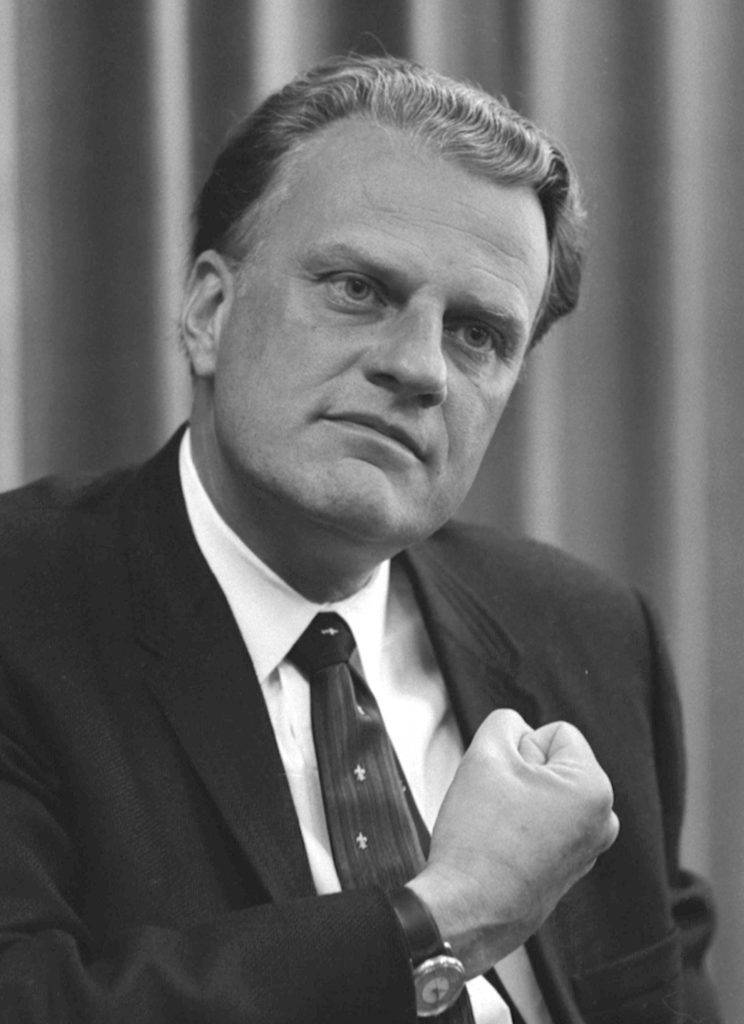Billy Graham’s Crusades, Among Others
By • February 22, 2018 0 795

Going all the way back to that almost presidential, almost soothing, show business-like State of the Union message from President Donald Trump, through the ominous, perilous days of the memo that spewed out of the House Intelligence Committee, to it-seems-like-daily emergence of more sexual abusers of some sort or another, there has been an abundance of news — dizzying, often violent, calling up that pungent British usage: gobsmacking.
Made you sit down just to breathe. “White House in Turmoil” has become a sort of standing headline, a semipermanent state of being. For every quasi-normal event — a dignitary’s visit, for instance — there were would be indictments from the Russia investigation or murders and shootings.
Even White House Chief of Staff John F. Kelly was starting to step in it, and worries about his fate were being bandied about openly. Scandals were not scarce (one example: the case of the close adviser who had no clearing and was rumored to be a wife abuser).
High-energy as the headlines were, there was something tiring and familiar. Everything new, these days, seems sometimes old again. Famous and famous-ish people — like the elegant writer and essayist Nicholas von Hoffman or the smooth from-another-era singer Vic Damone — pass away and we note their absence and remember words and music.
When it comes to Billy Graham, a man who even at 99 still embodied the personage and definition of evangelist, we are dealing with a different stratosphere, one occupied by faith, by eloquence, to be sure, by some kind of definition of the idea of American, by numbers (as in millions who heard him, who saw him and were affected by him) and his crusades.
This North Carolina-born Christian who spread the gospel in ways no one else had done, first in small tents, where his voice thundered, then at state fairs, in auditoriums and in places all around the world, even where there were no Christians. He was handsome in that stately country-music kind of way; if Johnny Cash were an evangelist — and he sometimes was — Graham was one version of him.
His stance of strength was tempered by an odd naiveté. Finally, he passed through to that invincible status of icon.
He had his weaknesses. The taped conversation with Nixon is often referred to. He apologized for that openly stated anti-Semitism with an authenticity every bit sincere as his love of Jesus.
In the South, he refused to ban African Americans from his sermons, in fact, cut the ropes that might have let it happen.
In the end, he became not just the people’s preacher, but also the preacher of presidents, an approximation to power that proved a little seductive. He saw it all as doing his job. Asked what name he would like to see on his tombstone, he said, simply: “Preacher.”
Amen to that.
We saw familiar things this past few days. Students running and screaming in the hallways of their school, Marjory Stoneham Douglas High School in Parkland, Florida, where 17 people, most of them students, were killed by a fellow student armed with an AR-15.
The usual things happened: calls for gun control (or at least limits on semiautomatic weapons), blame and counter-blame, vitriolic charges by the National Rifle Association.
Except this time was different. The students themselves, angry, afraid, eloquent, took to the schools, the streets, to an audience with the president. They were on their own crusade.
What they said made sense in the most bloody awful way. They made signs (“We Are Not Safe”), they rejected “thoughts and prayers” and yelled for action. One student asked why the government refused to protect students, the victims of what is now a long list of mass shootings in schools, from Columbine to last week’s massacre.
The passion of the students, the kids — especially when the flowers and the memorials are fresh, the funerals ongoing — feels resonant and strong enough to echo. It contains the kernels of fear as well as outrage, something you can plant like a seed like Black Lives Matter or #metoo. If not them, who?
President Trump, while expressing authentic sympathy, also offered up his usual solution: arm the teachers. The students are saying that it starts with guns.
Say hey.
One student, senior Emma Gonzalez, proclaimed: “We are going to be the kids you read about in textbooks. Not because we’re going to be another statistic about mass shooting in America, but because … we are going to be the last mass shooting.” “We are going to be the kids you read about in the textbooks.” Repeatedly, to the politicians, she said: “We call B.S.”
Say hey.

